
| WB | 咨询技术 | Human,Mouse,Rat |
| IF | 咨询技术 | Human,Mouse,Rat |
| IHC | 1/25-1/100 | Human,Mouse,Rat |
| ICC | 技术咨询 | Human,Mouse,Rat |
| FCM | 咨询技术 | Human,Mouse,Rat |
| Elisa | 1/5000-1/10000 | Human,Mouse,Rat |
| Aliases | GNTM; C24GNT; C2GNT2; C2GNTM; C2/4GnT |
| Host/Isotype | Rabbit IgG |
| Antibody Type | Primary antibody |
| Storage | Store at 4°C short term. Aliquot and store at -20°C long term. Avoid freeze/thaw cycles. |
| Species Reactivity | Human, Rat |
| Immunogen | Fusion protein of human GCNT3 |
| Formulation | Purified antibody in PBS with 0.05% sodium azide and 50% glycerol. |
+ +
以下是关于GCNT3抗体的3篇参考文献的简要信息(注:文献为虚构示例,实际引用需根据真实数据库检索):
---
1. **文献名称**:*GCNT3 overexpression promotes tumor progression in colorectal cancer*
**作者**:Juan, F. et al. (2018)
**摘要**:研究通过免疫组化分析发现,GCNT3在结直肠癌组织中高表达,并与患者不良预后相关。实验表明GCNT3抗体可抑制癌细胞侵袭,提示其作为治疗靶点的潜力。
2. **文献名称**:*GCNT3 as a biomarker for pancreatic ductal adenocarcinoma*
**作者**:Li, Y. et al. (2020)
**摘要**:利用GCNT3特异性抗体检测胰腺导管腺癌(PDAC)样本,发现GCNT3表达水平与肿瘤转移呈正相关,可能通过调控粘蛋白糖基化促进肿瘤微环境重塑。
3. **文献名称**:*Functional role of GCNT3 in gastric cancer chemoresistance*
**作者**:Sethi, M.K. & Chen, W. (2019)
**摘要**:研究发现GCNT3在胃癌中通过介导O-糖基化修饰增强癌细胞对化疗药物耐药性,使用GCNT3抗体阻断其活性可部分逆转耐药表型。
---
(注:以上文献信息为模拟生成,实际研究中需查阅PubMed、Web of Science等数据库获取真实文献。)
The GCNT3 (Glucosaminyl (N-Acetyl) Transferase 3) antibody targets an enzyme within the glycosyltransferase family, which plays a critical role in synthesizing mucin-type O-glycans. GCNT3. also known as Core 3 synthase, catalyzes the formation of core 3 O-glycan structures (GlcNAcβ1-3GalNAcα1-Ser/Thr), essential for mucosal protection and cell signaling. Dysregulation of GCNT3 is implicated in cancer progression, particularly in gastrointestinal and pancreatic cancers, where its downregulation correlates with tumor aggressiveness and poor prognosis.
GCNT3 antibodies are primarily used in research to study O-glycosylation patterns, cellular localization, and expression levels in normal vs. diseased tissues. They enable detection via techniques like Western blotting, immunohistochemistry (IHC), and immunofluorescence (IF). Recent studies highlight GCNT3's potential as a biomarker for cancers, such as colorectal carcinoma, where its loss may promote metastasis by altering cell adhesion and immune evasion.
Therapeutic interest in GCNT3 is emerging, with antibodies aiding in exploring its role in modulating glycan-mediated pathways or restoring dysregulated glycosylation in malignancies. However, functional complexity and tissue-specific expression of GCNT3 necessitate further validation of antibody specificity and clinical relevance. Overall, GCNT3 antibodies serve as vital tools for unraveling glycosylation mechanisms in disease and guiding biomarker or therapeutic development.
×